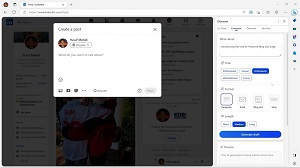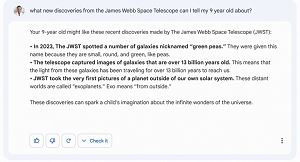News
Let the AI Search Wars Begin: Bing vs. Bard
Following the success of GitHub Copilot for software development and ChatGPT for sentient-sounding chatbots, Microsoft announced a new "copilot for the web" experience for its Bing search engine within a day of Google unveiling a similar project, Bard.
While Google's search engine has long dominated the space, relegating Bing to minor-league status, Microsoft's partnership with OpenAI to create and use cutting-edge AI tech may get it back into the race.
Microsoft is previewing the new Bing experience in a new Edge browser build, with access granted upon application to a waitlist.
"AI will fundamentally change every software category, starting with the largest category of all -- search," said Satya Nadella, chairman and CEO, Microsoft in a Redmond press event today (Feb. 7). "Today, we're launching Bing and Edge powered by AI copilot and chat, to help people get more from search and the web."
The term "copilot" was used often during the event, as Microsoft apparently likes the branding term used by GitHub, which it owns. GitHub Copilot, of course, stunned the software development world in 2021 when it was unveiled as an "AI pair programmer" that could complete lines of code and even generate entire code constructs (or even simple, full projects) in response to natural language commands entered into an IDE or code editor like Visual Studio Code.
After GitHub Copilot came ChatGPT, also from OpenAI, which you presumably already know all about.
GitHub Copilot uses a coding-optimized machine language system from OpenAI called Codex, while ChatGPT uses one called GPT, now at version 3.5. Microsoft said its new Bing uses a new, next-generation OpenAI large language model that is more powerful than ChatGPT, customized specifically for search. "It takes key learnings and advancements from ChatGPT and GPT-3.5 -- and it is even faster, more accurate and more capable," exec Yusuf Mehdi said in a Feb. 7 blog post titled, "Reinventing search with a new AI-powered Microsoft Bing and Edge, your copilot for the web."
 [Click on image for larger view.] Composing with Edge on LinkedIn (source: Microsoft).
[Click on image for larger view.] Composing with Edge on LinkedIn (source: Microsoft).
Microsoft said the new Bing/Edge enhancements bring together search, browsing and chat into one unified experience that can be invoked from anywhere on the web, delivering:
- Better search. The new Bing gives you an improved version of the familiar search experience, providing more relevant results for simple things like sports scores, stock prices and weather, along with a new sidebar that shows more comprehensive answers if you want them.
- Complete answers. Bing reviews results from across the web to find and summarize the answer you're looking for. For example, you can get detailed instructions for how to substitute eggs for another ingredient in a cake you are baking right in that moment, without scrolling through multiple results.
- A new chat experience. For more complex searches -- such as for planning a detailed trip itinerary or researching what TV to buy -- the new Bing offers new, interactive chat. The chat experience empowers you to refine your search until you get the complete answer you are looking for by asking for more details, clarity and ideas -- with links available so you can immediately act on your decisions.
- A creative spark. There are times when you need more than an answer -- you need inspiration. The new Bing can generate the content to help you. It can help you write an email, create a 5-day itinerary for a dream vacation to Hawaii, with links to book your travel and accommodations, prep for a job interview or create a quiz for trivia night. The new Bing also cites all its sources, so you're able to see links to the web content it references.
- New Microsoft Edge experience. We've updated the Edge browser with new AI capabilities and a new look, and we've added two new functionalities: Chat and compose. With the Edge Sidebar, you can ask for a summary of a lengthy financial report to get the key takeaways -- and then use the chat function to ask for a comparison to a competing company's financials and automatically put it in a table. You can also ask Edge to help you compose content, such as a LinkedIn post, by giving it a few prompts to get you started. After that, you can ask it to help you update the tone, format and length of the post. Edge can understand the web page you're on and adapts accordingly.
Google, meanwhile, is staking its search leadership position on Bard, announced the day before today's Microsoft event. It has been characterized as Google's answer to ChatGPT.
 [Click on image for larger view.] Asking About the James Webb Telescope (source: Google).
[Click on image for larger view.] Asking About the James Webb Telescope (source: Google).
"We've been working on an experimental conversational AI service, powered by LaMDA, that we're calling Bard," said Sundar Pichai, CEO of Google and Alphabet, in a blog post. And today, we're taking another step forward by opening it up to trusted testers ahead of making it more widely available to the public in the coming weeks."
Not so much is known about LaMDA and other AI tech Google is developing, which includes PaLM (a large language model -- or LLM -- like ChatGPT), Imagen (text to images) and MusicLM (generating music). Google said it's working to bring those recent AI advancements into various products, starting with Search.
"One of the most exciting opportunities is how AI can deepen our understanding of information and turn it into useful knowledge more efficiently -- making it easier for people to get to the heart of what they're looking for and get things done," Pichai said. "When people think of Google, they often think of turning to us for quick factual answers, like "how many keys does a piano have?" But increasingly, people are turning to Google for deeper insights and understanding -- like, "is the piano or guitar easier to learn,' and 'how much practice does each need?' Learning about a topic like this can take a lot of effort to figure out what you really need to know, and people often want to explore a diverse range of opinions or perspectives.
"AI can be helpful in these moments, synthesizing insights for questions where there's no one right answer. Soon, you'll see AI-powered features in Search that distill complex information and multiple perspectives into easy-to-digest formats, so you can quickly understand the big picture and learn more from the web: whether that's seeking out additional perspectives, like blogs from people who play both piano and guitar, or going deeper on a related topic, like steps to get started as a beginner. These new AI features will begin rolling out on Google Search soon."
About the Author
David Ramel is an editor and writer at Converge 360.